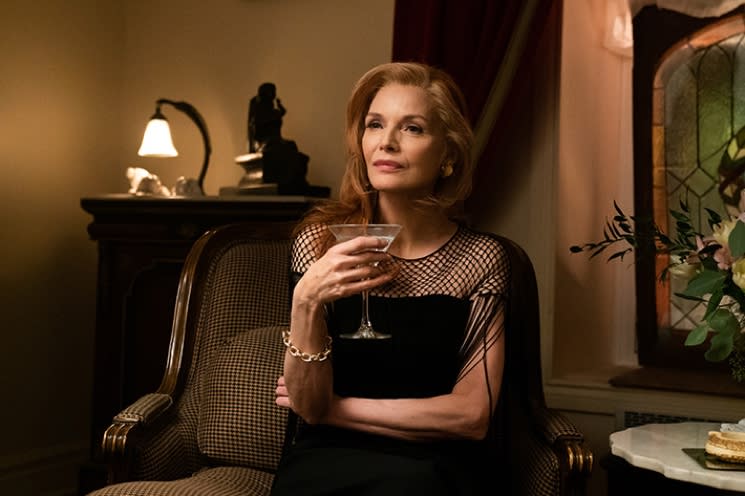Frances Price's listless, privileged life is riddled by clichés. After the suspicious death of her husband, her fortune dwindles, leaving the New York socialite (played effortlessly by Michelle Pfeiffer), her son Malcolm (Lucas Hedges) and their black cat Small Frank disgraced and at the end of their legacy. Frances is forced to forfeit her property, possessions and, ultimately, her glamour. Thankfully, one of the widow's few allies offers the family a home in her vacant Paris apartment. There, Frances commits to her so-called French exit from society and plots to end her life once the small stack of euros lining her closet has run out.
As evidenced by Frances' reluctance to change the course of her life, French Exit affirms the existence of a certain ennui that only the very wealthy are afforded. An almost delusionally nihilistic story (originally penned as a novel of the same name by Patrick deWitt), the film is underpinned by this type of detachment from reality, both social and metaphysical.
Director Azazel Jacobs delivers deWitt's deadpan script in a fittingly surreal form. Frances and Malcolm, though destitute, float through their transatlantic lives untethered by the real hardships of common folk: they cross the ocean via cruise ship, removed from the adversity of the world outside their economic bubble; Frances pays for coffee with a $100 bill and sets a vase of flowers alight when a waiter ignores her. Yet in all their paradoxical affluence, Jacobs manages to draw a sliver of humanity from the Prices. Pfieffer's Frances offers a cool madness, an elegance akin to Lucille Bluth, cracked by emotional neglect, while Hedges' Malcolm presents an unaffected stoicism through quiet apathy and pitiful aimlessness.
The audience has no material reason to feel sorry for the Prices, and yet we're offered moments of pure humanity somehow unmoored by the confines of class or social standing. The film's aura of indifference breaks in interspersed moments, revealing French Exit's subtle emotional core. When the mother and son are sent into a frenzy trying to find a lost Small Frank — who may or may not be the corporeal host of Frances' late husband — mysticism begins to steer the plot towards comedic absurdity. Devolving from there, the desperate Prices harness the powers of telepathy to locate their feline family member, and all structure melts away.
"My life is riddled by clichés, but do you know what a cliché is?" Frances ponders in the film's third act, "It's a story so fine and thrilling that it's grown old in its hopeful retelling." While the fine story of French Exit evades any notion of thrill, it does offer hopefulness, even for its most hardened, hopeless characters. In lieu of serving up resolve or even penance, the story focuses instead on the development of its own humanity, awakened only by stripping its characters bare with grief and financial ruin.
French Exit is out on VOD on June 15.
(Elevation Pictures)As evidenced by Frances' reluctance to change the course of her life, French Exit affirms the existence of a certain ennui that only the very wealthy are afforded. An almost delusionally nihilistic story (originally penned as a novel of the same name by Patrick deWitt), the film is underpinned by this type of detachment from reality, both social and metaphysical.
Director Azazel Jacobs delivers deWitt's deadpan script in a fittingly surreal form. Frances and Malcolm, though destitute, float through their transatlantic lives untethered by the real hardships of common folk: they cross the ocean via cruise ship, removed from the adversity of the world outside their economic bubble; Frances pays for coffee with a $100 bill and sets a vase of flowers alight when a waiter ignores her. Yet in all their paradoxical affluence, Jacobs manages to draw a sliver of humanity from the Prices. Pfieffer's Frances offers a cool madness, an elegance akin to Lucille Bluth, cracked by emotional neglect, while Hedges' Malcolm presents an unaffected stoicism through quiet apathy and pitiful aimlessness.
The audience has no material reason to feel sorry for the Prices, and yet we're offered moments of pure humanity somehow unmoored by the confines of class or social standing. The film's aura of indifference breaks in interspersed moments, revealing French Exit's subtle emotional core. When the mother and son are sent into a frenzy trying to find a lost Small Frank — who may or may not be the corporeal host of Frances' late husband — mysticism begins to steer the plot towards comedic absurdity. Devolving from there, the desperate Prices harness the powers of telepathy to locate their feline family member, and all structure melts away.
"My life is riddled by clichés, but do you know what a cliché is?" Frances ponders in the film's third act, "It's a story so fine and thrilling that it's grown old in its hopeful retelling." While the fine story of French Exit evades any notion of thrill, it does offer hopefulness, even for its most hardened, hopeless characters. In lieu of serving up resolve or even penance, the story focuses instead on the development of its own humanity, awakened only by stripping its characters bare with grief and financial ruin.
French Exit is out on VOD on June 15.




